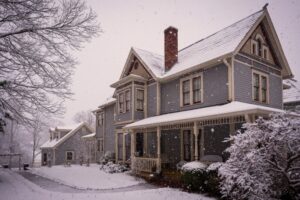In our area, there are many homes old enough to be considered historic. But even the average home is not new. According to recent US census data, the average home in Virginia is 38 years old. Construction methods have changed a lot, and older homes have different needs from those built in the last 20 years or so.
How does the age of your home affect your ability to keep it warm? What can you do to heat your old home more effectively and efficiently? We’ve got some information about your options, and the benefits and drawbacks of each.
Insulation
The first thing you should consider is the insulation in your home. Many organizations recommend replacing any insulation every 15-20 years. Even fiberglass insulation, which could theoretically last most of a century, usually becomes ineffective or even hazardous over a couple of decades as it is degraded by moisture and contaminated with mold.
If your home was built in the 1970s or earlier, it’s critical to determine if it contains vermiculite. This type of insulation was extremely popular for quite a while, but it was made with asbestos. If your home contains vermiculite, you will need to consult an expert in asbestos remediation.
Regardless of whether you heat with a gas or electric furnace or with a boiler system, your insulation will be the biggest factor in how much that system has to run to keep your home warm, and how much energy it will consume. Rather than continue to spend a lot of extra money on your energy bills, you should seriously consider investing in good insulation.
Ductwork
Some homes have ductwork that is as much as fifty years old. Any ductwork over ten years old should be thoroughly inspected for leaks. The average American home’s ductwork is so leaky that the estimated loss of heated or cooled air is 30%! Repairing or replacing your ductwork could also make a huge difference in keeping your home warmer and your energy use lower.
Energy-Efficient Heating Systems
If your heating system is getting older and you know replacement is in the not-too-distant future, look into the new options available for energy efficiency. While new furnaces and boilers are better at minimizing energy use than those from just ten years ago, you might also consider how a heat pump could provide much of the heat you need at a fraction of the cost.
Maintenance, Repair, and Replacement
If you don’t invest in insulation, ductwork, and an energy-efficient heating system, you won’t just be spending more money on your utility bills. Because of the higher-than-average usage of your heating system, it will accrue more wear and tear. A heating system that has to work harder and run more of the time would do best with more-frequent maintenance. It is more likely to require repair. And it will have to be replaced sooner.
Whether you’ve got concerns about leaky old ducts, you want to learn more about your options for efficient HVAC in Alexandria, VA, or you need to schedule maintenance or repair for your heating system, we’ve got you covered!
Contact us today to schedule an appointment or ask any questions you have about heating your home.



